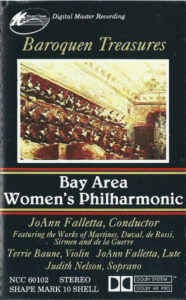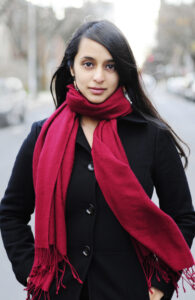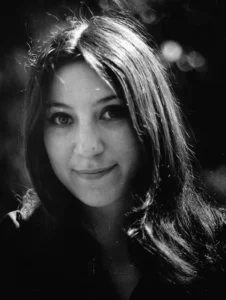We hope your new year is off to a great start!
On January 25th, 2025, the MusicaNova Orchestra will present its program “Resistance & Unity: Women Rise” at the Musical Instrument Museum in Phoenix, Arizona. Among the works performed will be Reena Esmail‘s Zeher (for cello and strings) and Victoria Yagling‘s Suite for Cello and Strings, both featuring cellist Rhonda Rider. There was some speculation that a work by Florence Price might also appear on the program—as of January 5th that does not appear to be the case. Two other works for string orchestra featured are Warren Cohen’s Concerto Grosso no. 1 for String Quartet and String Orchestra and the classic Fantasia on a Theme of Thomas Tallis by Ralph Vaughan Williams.
A hallmark of many of American composer Reena Esmail‘s composition is their elements of Indian classical music. These range from very easy-to-acknowledge elements such as titles—including Zeher, the Hindi word for poison— to more sophisticated elements that require intensive listening or knowledge of Indian classical music traditions and techniques. One of the most distinctive parts of Esmail’s music is how she blends elements of contemporary Western and Indian classical musics. This is not music of one tradition written for an ensemble from another, but an attempt to embrace many different facets of her Indian and American identities. The expression of the piece is also intensely personal: she wrote it while batting a serious illness (unspecified) that made speaking, swallowing, and breathing difficult.
Here is the string quartet rendition of Esmail’s Zeher, performed by the Trellis String Quartet in 2023 at the University of Delaware.
Victoria Yagling was a Soviet-era cellist and composer who faced similar challenges to Dimitri Shostakovich under the political regime in the U.S.S.R. She studied at the Moscow Conservatory with Rostropovich Kabalevsky, and Khrennikov—an enviable roster of mentors, for anyone—and won both the Gaspar Cassadó International Competition in Florence (1969) and second prize in the Tchaikovsky Competition (1970). Balancing Soviet orthodoxy and her own artistic ideas was always a challenge, though she found much success in judging competitions and teaching in institutions in the Soviet Union. Her career as an international performer ultimately suffered, as the Soviet government refused to allow her to travel or perform in capitalist countries during the 70s and 80s. After the fall of the Berlin Wall she emigrated to Finland.
On January 4th, Diane Jones presented “The All-Women Orchestra” (Season 9 Episode 20) on Feminine Fusion on Classic FM, supported by WCNY-FM Syracuse and PBS. Feminine Fusion is a 1-hour weekly radio program that celebrates the contributions and influence of women in classical music. Women are the unifying force of the program, though it covers much more than compositions by women whose names we know. The program crosses boundaries of culture, gender, and race to explore the broad influence of women in music, both including and beyond composition. Diane Jones, host of the program, is quoted saying, “Had you asked me 10 years ago if I would have introduced a program focused on women in music, I would have said ‘no.’ Growing up in a houseful of brothers, I was always treated as their equal,” says Jones. “But there is still gender bias in the music world. I am anxious for the time when we no longer separate composers from women composers, or conductors from women conductors.” (wcny.org) 
Though this program may have new and veteran listeners in WPA’s readership, I’d like to draw attention to “The All-Women Orchestra” in particular. Not only does it resonate generally with the legacy of the Women’s Philharmonic Orchestra and other women’s orchestras across the globe, but it also features a vintage recording of the ensemble from back when it was still called the Bay Area Women’s Philharmonic. The BAWP is the only women’s orchestra on the program to also feature music by a woman composer. They are heard playing Maddalena Sirmen‘s Violin Concerto No. 5, featuring Terrie Baune (violin). The recording—circa 1990— is taken from the BAWP album Baroquen Treasures, which in addition to Sirmen features works by Marianne Martines, Camilla de Rossi, Mademoiselle Duval, and Elizabeth Claude Jacquet de la Guerre.
“The All-Women Orchestra” can be streamed online via the Public Radio Exchange.
In-person sessions for the Hart Women Conductors Institute began on January 17, 2025, following its virtual sessions from the fall (November 18–22, 2024) with in-person sessions on January 17–25, 2025. During their residency, participants Jiannan Cheng, Anna Castro Grinstein, Valery Saul, and CJ Wu will have one-on-one mentoring, group workshops, and lead rehearsals leading up to the annual showcase concert on Saturday, January 25, 2025, at 7:30 p.m. in the Winspear Opera House. The program will feature excepts from four operas: Purcell’s Dido and Aeneas, Strauss’ Der Rosenkavalier, Bizet’s Carmen, and Frank’s El último sueño de Frida y Diego. The concert will also feature participating vocalists from the Indiana University Jacobs School of Music: sopranos Ashley Ruckman and Siyi Yan; mezzo-soprano Veronica Siebert; tenors Jinpark Choi and Josh Hooker; and baritone Robert Wente. Each conductor will lead the guest singers and the Dallas Opera Orchestra in one of the four opera excerpts—a wonderful opportunity for all of them to showcase their skill in an operatic “tasting menu” of sorts. Listeners will have a now-rare opportunity to hear multiple eras and styles of opera on the same live concert program; a practice that was much more common for historical audiences than it is for us 21st century opera-goers.
The Hart Institute’s mission is to provide training and career support to women conductors, which it takes as direct action against significant gender imbalance in the profession. Combinations of residencies and performances allow for mentees to improve their already-remarkable skills and showcase them for audiences who might not otherwise hear them. A special feature of this concert for audiences is the “performer’s eye-view” of the conductor: in addition to seeing them the in the usual manner (i.e., backs to the orchestra), audiences will be able to see each conductor on camera via live video stream projected above the orchestra.
2025 rehearsals for the African Women’s Orchestra (AWO) began on January 4, 2025. They have regularly performed on/around International Women’s Day since 2017. In 2024 they added a concert at the residence of the Spanish Ambassador to Kenya to their engagements, supported by the Kenya Cultural Centre, the Kenya National Theatre, the Spanish Ministry of Culture, and the Embassy of Spain in Kenya. We hope to hear great things from this orchestra, both on International Women’s Day and throughout the year!
Let us know what you’re listening to in 2025! Email us at info@wophil.org


